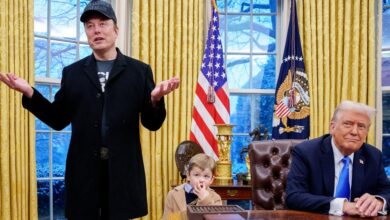A CEO with 500 workers explains why he’s suing Trump over tariffs: “This path is catastrophic”

Learning Resources CEO Rick Woldenberg is taking a stand against the Trump administration’s tariffs, which he believes will have catastrophic consequences for his family-owned toy business and the wider U.S. economy. In a bold move, Woldenberg has filed a lawsuit against President Trump and his administration, challenging the legality of the sweeping import duties that have been imposed.
The lawsuit, filed in the U.S. District Court in Washington, D.C., argues that the administration has overstepped its authority by imposing these tariffs without the approval of Congress, which traditionally holds the power to authorize new tariffs or negotiate trade agreements. Woldenberg’s company, Learning Resources, which employs 500 people and sells a wide range of educational toys, is facing a staggering increase in import duties from $2.3 million to $100 million under the Trump administration’s trade policies.
The impact of these tariffs is already being felt, with Woldenberg predicting a 25% drop in sales for his company this year as consumers tighten their belts in response to the economic fallout. This is a significant blow to Learning Resources, which had previously anticipated an 8% increase in sales. Economists warn that the tariffs will slow economic growth in the U.S. and drive up inflation, further exacerbating the challenges faced by businesses like Learning Resources.
In response to the tariffs, Woldenberg is exploring options to shift his manufacturing operations out of China, where the majority of his products are currently produced. While Learning Resources has made some progress in diversifying its manufacturing base to countries like India and Vietnam, the process has been costly and time-consuming. Despite efforts to move 16% of production out of China, the company still faces significant challenges in fully reshoring its manufacturing operations.
President Trump has championed tariffs as a means to revive domestic manufacturing and create jobs in the U.S. However, critics like Woldenberg argue that the costs and complexities of reshoring production make this a challenging proposition for many businesses. Learning Resources lacks the financial resources to build its own factory in the U.S., making it difficult to fully embrace the “Made in America” label that some customers desire.
As Woldenberg navigates the turbulent waters of the trade war, he remains resolute in his belief that the tariffs imposed by the Trump administration are harmful and unsustainable. By taking legal action and speaking out against the damaging effects of these policies, he hopes to protect his business and send a message about the broader implications of the administration’s trade stance. Finding a manufacturer to produce products has become a challenging task for many businesses, including Learning Resources. The company’s CEO, Rick Woldenberg, expressed his frustration, stating, “We can’t even find somebody to make six or 10 products.” This difficulty stems from the lack of capability among U.S. manufacturers to produce the specific types of products that Learning Resources offers. Additionally, the cost of manufacturing these products domestically would be prohibitively high for the company.
Woldenberg highlighted the disparity between his business and larger corporations like Apple, who have announced plans to invest billions in expanding their U.S. manufacturing capabilities. While Apple focuses on a limited number of products, Learning Resources offers a wide range of over 2,000 products, making it more challenging to find suitable manufacturers.
Despite these challenges, Woldenberg is committed to keeping his 500 employees employed during this uncertain time. He emphasized the importance of supporting his workforce, especially in the face of economic uncertainties caused by trade wars and tariffs. Woldenberg recalled the challenges his company faced during the pandemic and how they managed to support their employees without any pay cuts.
Looking ahead, Woldenberg hopes for a resolution to the tariff issues imposed by the Trump administration. He believes that reverting to pre-tariff conditions would be beneficial for businesses like his and would allow for more sustainable growth. He emphasized the need for a new plan that supports businesses and workers alike, rather than the current ineffective tariff approach.
In conclusion, the challenges faced by Learning Resources in finding suitable manufacturers underscore the complexities of the current economic landscape. Despite these obstacles, Woldenberg remains dedicated to supporting his employees and navigating through these uncertain times. The call for a more favorable trade policy reflects the concerns of many businesses looking to thrive in a competitive global market.





